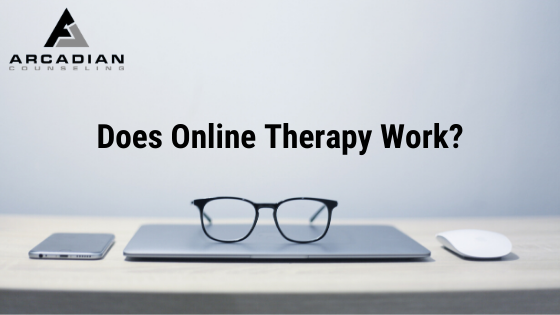You’ve been told to stay home. You’re suddenly trying to figure out how to work remotely when you’ve never really done it before. Maybe you have kids who are craving your constant attention. Maybe you’re alone and feel isolated and bored. Every time you look at the news, feelings of panic and dread overwhelm you. You’re struggling to sleep. You can’t seem to focus or concentrate. Things feel hard. Really hard. Welcome to your new life – for now. But how long is “now?”
You want help but you’re not sure where to turn. But you’re old school. You like things face-to-face. And quite frankly, you’ve had enough of FaceTime and Zoom meetings. So, you go online and look for help with anxiety, or relationships, or coping skills. You search google for “therapist near me” and everyone says, “Now offering online therapy!”
Now you’re wondering, “Does online therapy really work?”
Let’s first look at science. A 2014 study published in the Journal of Affective Disorders found that online therapy was just as effective as face-to-face therapy for depression. Another study published in 2014 in Behaviour Research and Therapy found that online cognitive behavioral therapy was effective in treating anxiety disorders. And in 2018, a study published in the Journal of Psychological Disorders found that online CBT was just as effective as face-to-face therapy for major depression, panic disorder, social anxiety disorder, and generalized anxiety disorder. So there you have it.
Trying new things is hard for some. Whether you’ve been working with your therapist face to face and have recently transitioned into online counseling or you’re suddenly experiencing an increase in anxiety symptoms and need support, here are a few things make transitioning to online therapy easier.
Develop a Pre-Therapy Routine
Just like you would take a shower (hopefully), get dressed, get in your car and drive to your therapist’s office, it’s important to develop a routine prior to an online counseling session. Take a few minutes to move around as a way to prepare for the movement of emotions that may come up during your therapy session. Engage your senses and take a moment to think about what would feel good right now. Maybe a cup of coffee or tea. Grab a blanket or comfortable pillow to embrace during the session. Sometimes having something like a stress ball is comfortable to hang on to during online therapy sessions as it can help ground you and keep you focused.
Create a Comfortable & Private Space
This is easier for some, and harder for others. I have some clients who have created a space in their bathroom for their online therapy sessions. Others in their car. Some go for walks or sit outside. And others are simply able to use an extra bedroom, office, or private area of their home. Wherever it may be, try to make it as comfortable as possible. You can also use a white noise machine to help muffle what you’re saying. Good lighting is important for your therapist to be able to see you. Have a lamp in front of you rather than behind.
The Best Equipment
Make sure your laptop, tablet, or phone is fully charged prior to our online counseling session. If not, have the device plugged in during the session. Turn off all notifications and close out other applications. If you have to use your phone, turn on Do Not Disturb. Earphones are strongly recommended to prevent sound echoing for both you and your therapist. Bluetooth is ideal so you don’t get tangled up in cords. Noise-cancelling is ideal to create a more immersive feeling. But if you don’t have these, something is better than nothing. High speed internet with a bandwidth of 10 mbps is recommended for the highest quality and to prevent connection issues. But most importantly, make do with what you can for your online counseling session.
Decompress after the online therapy session
If you’re used to seeing your therapist or coach face to face, you have probably used the drive home or back to work as an opportunity to decompress or process. Since the commute is now removed for online sessions, it’s easy to jump right back into life around you. Kids, family, work, chores. However, doing so makes it harder to process and register what you just discussed with your therapist. I recommend clients take notes during online sessions to help with focus. After the session is a great time to go through your notes and digest whatever emotions are present. If you’re not a note-taker, take a quick walk outside or do a 5 minute mindful meditation to help restore balance and prepare you for the next part of your day.
For many, seeing a therapist face to face is ideal. However, very little about our lives right now is ideal. Online therapy can help to bridge the gap until you’re comfortable, or able, to see your therapist face to face. It’s best to try to create an environment that mimics the face to face interactions as much as possible. Take a few moments before the session to prepare and get comfortable and be sure to take a few after to process.
James Killian, LPC is the Principal Therapist & Owner of Arcadian Counseling in New Haven, CT where they specialize in helping over-thinkers, high achievers, and perfectionists take control and move From Surviving to Thriving.

